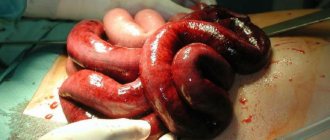Ways to manifest flatulence
Flatulence in adults is also characterized as swelling or bloating, during which discomfort occurs in the abdominal area, accompanied by rumbling, belching, and sometimes constipation or diarrhea. Attacks of spasms and pain are possible. Flatulence can also occur with the constant release of gases that have an odor. The condition improves significantly after a person has bowel movements. As a rule, such disorders appear in the afternoon, when the digestive system is actively working.
If the accumulation of gases occurs in a certain part of the intestine, so-called local flatulence, pain is observed. When gases are retained at the bend of the intestine, where the spleen is, in addition to the standard manifestations, pain is felt on the left side and severe bloating. Gases in the liver area are manifested by a feeling of overeating and pain on the right side under the ribs and shoulder blade.
flatulence in adults
With flatulence, which occurs due to dysfunction of the small intestine, bloating is observed, while the colon is characterized by a feeling of fullness, distension on the sides. In addition to the standard manifestations, the patient experiences vomiting, shortness of breath, unpleasant belching, heart pain, rapid heartbeat, and general weakness.
Flatulence, which is observed over a long period of time, not only has a detrimental effect on human health (heart problems, insomnia, weakness), but also limits the ability to communicate with other people.
What is increased gas formation?
Bloating brings considerable discomfort
Increased gas production is also called flatulence. In medicine, flatulence is understood as a symptom of gastrointestinal diseases, characterized by excessive gas production in different parts of the intestine.
Most often, increased gas formation is associated with the activity of intestinal bacteria. Overfilling of the intestines with gas is accompanied by bloating, pain and discomfort.
Flatulence can be of two types: with the release of gas and without the release of gas. The first type is characterized by active release of gas from the rectum. The second type is characterized by increased bloating.
Causes of gas formation in the gastrointestinal tract
Despite the fact that flatulence is classified as a problem associated with the gastrointestinal tract, there are initial stages that negatively affect the condition of the intestines, by eliminating which you can independently eliminate the accumulation of gases.
Physiological reasons
- Frequent consumption in the diet of foods that affect gas formation (brown bread, kvass, legumes, cabbage, fats). This leads to the fact that the intestines cannot cope with the timely removal of accumulated gases.
- If you frequently swallow air while eating, this happens when you eat hastily or smoke.
- Flatulence in most people is caused by problems with the gastrointestinal tract. But a similar phenomenon is also often observed after 50 years, when the intestinal walls atrophy, they weaken and become prominent, which contributes to the accumulation of gases.
During pregnancy
- In the third trimester, irregular gases often occur, accompanied by belching, constipation and heartburn. The reason for this is compression of the intestines due to an enlarged uterus.
- Progesterone, produced by the placenta to maintain pregnancy, has a relaxing effect, which causes gas retention.
- A woman expecting a baby increases the load on the pancreas and liver. This leads to digestive disorders and increased formation of gases.
- If the breakdown and absorption of substances by the body is impaired, insufficient fermentation of the esophageal fibers occurs, which provokes fecal retention and the inability to remove excess gases.
Infectious diseases
Inflammatory processes that occur under the influence of microorganisms (pathogenic) and affect the large and small intestines, leading to disruption of the digestive system. The result is the inability to move gases through the intestinal walls.
- Acute intestinal infections, in which diarrhea, nausea, vomiting and colic occur. The accumulation of gases occurs during rotavirus infection, dysentery, salmonellosis, gastritis and other gastrointestinal lesions.
- Intestinal candidiasis. When immunity decreases, fungal flora is activated, which is an ideal environment for flatulence.
- An intestinal infection caused by Giardia (single-celled parasites) that live in the lumen of the small intestine. If this cause of flatulence is present, the patient will lose a lot of weight, and there will be increased excitability and irritability.
- The presence of helminthiases in the body provokes swelling and bloating. In advanced forms, diarrhea with blood and rectal prolapse are characteristic.
Dysbacteriosis (changes in the normal intestinal flora) becomes the main cause of the development of infectious diseases that cause flatulence. There is a disruption of natural processes that go into the fermentation stage, thereby provoking gas formation.
Pathology of the large intestine
- Inflammatory processes for a long time, which were not treated in any way.
- In the presence of benign tumors, intestinal polyps, which slowly but progress. Constant flatulence, blood in the stool, acute fighting sensations can become the first signs of the development of cancer.
- With enlargement of the colon (congenital or acquired). The pain occurs both locally and diffusely, which makes it difficult to accurately determine the location of the anxiety in the gastrointestinal tract.
- When the structure of the intestinal wall is disrupted, it protrudes and the formation of air cysts. These are the reasons why the process of gas removal from the intestines slows down.
Diseases of the stomach and esophagus
- Flatulence can occur with lesions of the digestive tract (hernia, reflex disease).
- Gastritis with high acidity is also a cause of poor gas removal.
Purulent processes
- Peritonitis.
- Chronic appendicitis, abscess.
Problems with the genitourinary system
- Acute prostatitis negatively affects nearby organs, that is, the intestines.
- Severe form of pyelonephritis, renal colic, during which compression of the intestines occurs.
Endocrine system disorders
- Low thyroid hormone levels.
- Premenstrual syndrome.
causes and symptoms of flatulence
When to see a doctor?
Chronic flatulence may be associated with dangerous pathologies that require medical supervision. You should consult a doctor if the following symptoms appear:
- Significant weight loss.
- Pale skin, constant weakness, dizziness, loss of appetite (symptoms of anemia).
- Constant diarrhea.
Diagnostics can reveal the most unexpected causes of pathological conditions. Thus, the causes of bloating and gas are usually related to the characteristics of the intestinal microbiome.
What examinations need to be performed?
Due to the numerous causes of flatulence, it is difficult to immediately determine a diagnostic method to identify the source of the problem. The patient’s initial visit takes place at an appointment with a local therapist, who will give a referral for further examination by a gastroenterologist. Most of the patients who complained of gas accumulation had gastrointestinal disorders.
The list of necessary examinations includes:
- After a visual examination and palpation of the swellings, the patient is referred for colonoscopy and endoscopy. Having received the main indicators, a biopsy is taken from the stomach to study the problem in more detail.
- An ultrasound of the abdominal cavity allows you to see a full picture of what is happening, possible deviations, the condition of the organs, the presence of a cyst. If necessary, the doctor conducts an additional ultrasound examination of the liver, stomach, and pancreas.
- Examination of the abdominal cavity using an X-ray machine. The walls of the large and small intestines are visible.
- Passing pH measurements to identify disorders of gastric secretions.
- Blood and stool tests, which are given and examined in the laboratory.
What are the reasons for gas incontinence and fecal leakage?
This condition may be caused by congenital diseases or as a result of any disorders.
Thus, we can name the following causes of gas incontinence in both women and men:
- Anatomical defects, for example, fistulas in the anus or other developmental defects.
- Organic factors, these can be birth injuries, injuries to the fecal system, organic damage to the spinal cord or brain.
- Psychogenic causes - psychoses, neuroses, hysteria, etc.
Incontinence of gases and feces can act as a symptom of various diseases, for example, catatonic syndrome, dementia, manic-depressive syndrome, epilepsy.
Treatment of anal incontinence (incontinence of feces and gases) will be carried out depending on the cause that caused it.
Symptomatic therapy for flatulence
The number of flatulence is reduced or even disappears after proper adjustments to a person’s diet are made. With the obligatory limitation of foods that contribute to bloating and gas formation. Also, when eating, you should be in a calm environment, do not smoke at this time, and chew thoroughly. Avoid dry food and include first courses in your diet once a day. Simple physical exercises will have a beneficial effect on the removal of gases in the intestines. Until the cause of the disorder is finally determined, you can save yourself with absorbents, carminatives and other drugs.
If frequent bloating is accompanied by severe pain, colic or abnormal bowel movements, immediately go to the hospital for consultation with a specialist.
Intestinal gas
Gas formation in the intestines is a normal physiological process. The greatest contribution to this process is made by intestinal bacteria, which produce gas at different stages of metabolism.
Undigested food products enter the human large intestine, which feed the bacteria. The normal microflora of the large intestine produces a moderate amount of gas, but if the balance of bacterial colonies is disturbed, flatulence may develop.
Intestinal gases can consist of carbon dioxide, hydrogen, methane, nitrogen and sulfur dioxide. The latter chemical component gives the gas an unpleasant odor. This gas is typically a byproduct of the enzymatic breakdown of carbohydrates by bacteria.
Drug therapy
Such treatment will be effective for functional disorders of the excretory and digestive system. Most often, doctors prescribe two groups of medications:
- The first are aimed at restoring the functioning of the digestive and excretory system.
- The second group of medications can affect the muscle tone of the anus.
In extreme cases, doctors prescribe tranquilizers if the patient is very excitable.
Surgery
This method of treatment is used for injuries or defects of the sphincter. This type of surgery is called plastic surgery. Everything will depend on the degree of damage to the sphincter. Such operations are divided into the following types:
- sphincteroplasty;
- sphincterogluteoplasty;
- Thiersch surgery (rarely performed nowadays);
- Faerman's operation.
If there is no damage to the muscle fibers, then surgery is not performed.









